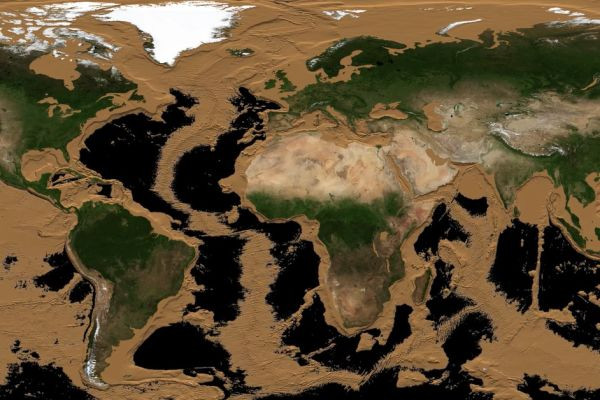Introduction
The vast expanses of Earth's oceans have always been a source of fascination and wonder for humanity. With their unexplored mysteries and hidden depths, the oceans hold the promise of unveiling secrets about our planet's history and the life that thrives beneath the waves. In this article, we embark on a visionary journey to contemplate the possibilities that lie ahead if we could fully map and explore the profound realms of Earth's oceans. Through scientific curiosity, technological advancement, and groundbreaking discoveries, the prospects of understanding our planet on a whole new level through deep-sea exploration and ocean mapping technology become within our reach.
The vast oceans that cover more than 70% of our planet have long remained a mysterious and uncharted frontier. But what if we could finally unlock the secrets hidden beneath the waves and fully map and explore the depths of Earth's oceans? In this article, we delve into the potential implications, discoveries, and challenges of undertaking such an extraordinary feat.
Delving into Unexplored Mysteries
For centuries, the oceans have captivated explorers and scientists alike. Despite significant advances in marine research, much of the ocean depths remain uncharted territory. By daring to map Earth's oceans comprehensively, we open doors to unraveling the enigmatic secrets concealed beneath the waves. The unexplored mysteries hold the key to understanding not only the origins of life on our planet but also the profound interconnectedness of Earth's ecosystems.
The Drive of Scientific Curiosity
Scientific curiosity has always propelled humanity forward, leading to breakthroughs and revelations that shape our understanding of the world. The oceans present an enticing challenge for scientists and researchers to venture into the unknown, to shed light on the ocean's complex ecosystems, and to explore the diverse marine life that exists at different depths. Through ambitious marine research, we foster a deeper appreciation for the richness and fragility of our oceans, inspiring us to become better stewards of the planet.
Technological Advancement
The Gateway to the Deep: Advancements in technology have played a pivotal role in expanding our capacity to explore the oceans. From sophisticated underwater vehicles to remote sensing and imaging systems, cutting-edge technology enables us to reach greater depths and gather detailed data on underwater terrains and life forms. The fusion of science and technology holds the promise of unlocking a trove of information that was once beyond our grasp.
Groundbreaking Discoveries Await
As we push the boundaries of deep-sea exploration, we can anticipate groundbreaking discoveries that could revolutionize our understanding of life and geology. From unknown species dwelling in the dark abyss to submerged geological features that shape our planet's landscape, each new revelation brings us closer to comprehending the intricacies of Earth's complex systems. These discoveries also fuel our imagination, as they may hold implications for potential extraterrestrial life on distant watery worlds.
Understanding Our Planet Holistically
The oceans are integral to the delicate balance of Earth's biosphere. By comprehensively mapping and exploring the ocean depths, we gain a more comprehensive picture of the planet as a whole. The insights gleaned from deep-sea exploration provide vital data for climate studies, marine conservation efforts, and sustainable resource management. Understanding our planet holistically is essential for safeguarding its future and the wellbeing of all life it supports.
The Promise of Marine Research Possibilities
Fully mapping and exploring Earth's oceans are gateways to endless marine research possibilities. Scientists envision creating marine protected areas, safeguarding fragile habitats and biodiversity. Additionally, studies into deep-sea minerals and resources offer potential for sustainable utilization while mitigating environmental impacts. The fusion of oceanography, marine biology, and geology paints a multifaceted portrait of Earth's oceans, igniting passions for exploration and conservation.
Shedding Light on Unexplored Realms
Fully mapping and exploring the ocean depths would allow us to venture into regions that have never been witnessed by human eyes. From the deepest ocean trenches to uncharted underwater mountain ranges, this endeavor could unveil a breathtaking diversity of marine life and geological wonders.
Unraveling Earth's History
The ocean floor preserves vital clues to Earth's geological history and the evolution of life on our planet. By mapping and exploring these underwater terrains, scientists could gain unprecedented insights into plate tectonics, climate change, and the migration of ancient species.
Discovering New Life Forms
The abyssal depths hold the promise of discovering novel and bizarre life forms, some of which may possess unique adaptations to survive in extreme conditions. This exploration could redefine our understanding of biology and evolution and possibly inspire advancements in biotechnology and medicine.
Implications for Climate Research
Understanding the ocean's vast and intricate ecosystems can significantly impact climate research. Mapping underwater currents, temperature variations, and carbon storage capacities can aid in predicting climate patterns, enabling more effective climate change mitigation strategies.
Environmental Conservation
Mapping the ocean depths can expose the impact of human activities on marine ecosystems, facilitating targeted conservation efforts. By understanding vulnerable areas and biodiversity hotspots, we can better protect marine life and preserve fragile underwater habitats.
Technological Challenges
The pursuit of mapping and exploring the ocean depths presents formidable technological challenges. From developing robust deep-sea vessels and autonomous underwater vehicles to designing sensors that withstand crushing pressure and extreme temperatures, innovation is essential for success.
Ethical Considerations
With the potential for commercial interests and resource extraction, the exploration of Earth's oceans raises ethical questions. Balancing scientific research with environmental stewardship and respecting the sovereignty of coastal nations requires careful deliberation.
The Quest for Sustainable Ocean Management
As we contemplate the immense potential of fully mapping and exploring Earth's oceans, we cannot overlook the urgent need for sustainable ocean management. Our oceans face unprecedented challenges from human activities, including overfishing, pollution, and climate change. By embarking on comprehensive deep-sea exploration, we gain valuable insights into the health and resilience of marine ecosystems, guiding us towards responsible practices that ensure the long-term vitality of these critical habitats.
Preserving Biodiversity and Protecting Endangered Species
The depths of the ocean harbor a myriad of fascinating and diverse life forms, some of which remain undiscovered. Fully understanding the richness of marine biodiversity not only enriches our knowledge of the natural world but also underscores the importance of conserving endangered species and their habitats. Through ocean mapping technology and marine research efforts, we can identify vulnerable areas and implement conservation strategies to protect these invaluable ecosystems.
Exploring Potential Medicinal Resources
Earth's oceans have the potential to be a treasure trove of medicinal resources. Many marine organisms are yet to be studied thoroughly for their possible contributions to pharmaceutical advancements. By exploring the ocean depths, we may uncover new compounds and substances that hold the key to curing diseases and improving human health.
Strengthening International Collaboration
The exploration of Earth's oceans is a monumental task that requires global collaboration. Countries and institutions around the world can unite their expertise, resources, and technologies to collectively advance marine research. Strengthening international cooperation fosters a shared responsibility for ocean conservation and allows us to pool our efforts in preserving these vital ecosystems.
Inspiring the Next Generation of Explorers
The quest to fully map and explore the depths of Earth's oceans is not only a scientific endeavor but also an inspiration for future generations of explorers and scientists. By showcasing the marvels of the ocean world and the wonders it holds, we ignite a passion for marine science and conservation among young minds. Encouraging interest in oceanography and related fields nurtures a generation of stewards dedicated to safeguarding the planet's most precious resource.
Conclusion
The vision of fully mapping and exploring the depths of Earth's oceans is a grand and audacious pursuit that holds the promise of unlocking a wealth of knowledge and understanding about our planet. From preserving biodiversity to unraveling climate change patterns and discovering medicinal resources, this endeavor has far-reaching implications for humanity's future. Embracing scientific curiosity, technological advancement, and sustainable practices, we embark on a transformative journey that not only enriches our knowledge but also nurtures a deep reverence for the majestic oceans that sustain life on Earth. Let us continue our quest, united in purpose, to explore, protect, and cherish these irreplaceable marine realms for the betterment of ourselves and generations to come.









